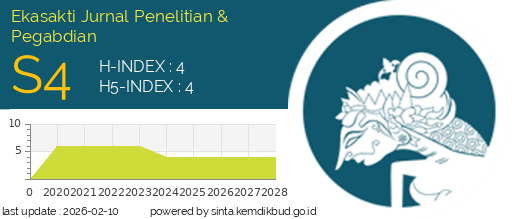Ethics In Public Administration As The Foundation Of Good Governance In The Digital Era
DOI:
https://doi.org/10.31933/ejpp.v5i2.1305Keywords:
Administrative ethics, good governance, digital era, bureaucracyAbstract
Administrative Ethics as the Foundation of Good Governance in the Digital Era discusses the importance of administrative ethics in establishing good governance, particularly within the ever-evolving digital context. In the digital era, new challenges have emerged in public service delivery, including the need for greater transparency, accountability, and responsiveness. This study aims to identify how administrative ethics can serve as a pillar in realizing the principles of good governance. Employing a qualitative approach, this research analyzes various policies and administrative practices implemented across different government agencies. The findings indicate that the application of administrative ethics not only improves the quality of public services but also strengthens public trust in the government. However, several challenges remain, such as the digital divide and the need for ethics training among civil servants. This study recommends the development of more inclusive policies and ongoing training to enhance ethical awareness within the bureaucracy.
References
Akpa, V. O., Asikhia, O. U., & Nneji, N. E. (2021). Organizational culture and organizational performance: A review of literature. International Journal of Advances in Engineering and Management, 3(1), 361–372.
Bertot, J. C., Jaeger, P. T., & Grimes, J. M. (2010). Using ICTs to create a culture of transparency: E-government and social media as openness and anti-corruption tools for societies. Government Information Quarterly, 27(3), 264–271.
Brown, M. E., & Treviño, L. K. (2006). Ethical leadership: A review and future directions. The Leadership Quarterly, 17(6), 595–616.
Fombrun, C. J., & Van Riel, C. B. M. (2004). Fame & fortune: How successful companies build winning reputations. FT press.
Heald, D. (2006). Varieties of transparency (Issue 135). Oxford University Press for The British Academy.
Hinduja, S., & Patchin, J. W. (2008). Cyberbullying: An exploratory analysis of factors related to offending and victimization. Deviant Behavior, 29(2), 129–156.
Kaptein, M. (2008). Developing and testing a measure for the ethical culture of organizations: The corporate ethical virtues model. Journal of Organizational Behavior: The International Journal of Industrial, Occupational and Organizational Psychology and Behavior, 29(7), 923–947.
Karpowitz, C. F., & Raphael, C. (2014). Deliberation, democracy, and civic forums: Improving equality and publicity. Cambridge University Press.
Kettl, D. F. (2013). System under stress: Homeland security and American politics. Sage.
Lazer, D. M. J., Baum, M. A., Benkler, Y., Berinsky, A. J., Greenhill, K. M., Menczer, F., Metzger, M. J., Nyhan, B., Pennycook, G., & Rothschild, D. (2018). The science of fake news. Science, 359(6380), 1094–1096.
Maak, T. (2007). Responsible leadership, stakeholder engagement, and the emergence of social capital. Journal of Business Ethics, 74, 329–343.
Mansell, R. (2012). Imagining the Internet: Communication, innovation, and governance. Oxford University Press.
O’neil, C. (2017). Weapons of math destruction: How big data increases inequality and threatens democracy. Crown.
Schein, E. H. (2010). Organizational culture and leadership (Vol. 2). John Wiley & Sons.
Solove, D. J., & Schwartz, P. M. (2022). An Overview of Privacy Law in 2022.
Treviño, L. K., den Nieuwenboer, N. A., & Kish-Gephart, J. (2024). A positive behavioural ethics perspective on organisational integrity. In Research Handbook on Organisational Integrity (pp. 129–161). Edward Elgar Publishing.
Weaver, G. R., & Treviño, L. K. (1999). Compliance and values oriented ethics programs: Influenceson employees’ attitudes and behavior. Business Ethics Quarterly, 9(2), 315–335.
Downloads
Published
How to Cite
Issue
Section
License
Copyright (c) 2025 Musri, Sayid Anshar, Puryanto, Onzukrisno, Baso Ifing

This work is licensed under a Creative Commons Attribution 4.0 International License.
Penulis yang mempublikasikan manuskripnya di jurnal ini menyetujui ketentuan berikut:
- Hak cipta pada setiap artikel adalah milik penulis.
- Penulis mengakui bahwa Ekasakti Jurnal Penelitian & Pegabdian (EJPP) berhak menjadi yang pertama menerbitkan dengan lisensi Creative Commons Attribution 4.0 International (Attribution 4.0 International (CC BY 4.0) .
- Penulis dapat mengirimkan artikel secara terpisah, mengatur distribusi non-eksklusif manuskrip yang telah diterbitkan dalam jurnal ini ke versi lain (misalnya, dikirim ke repositori institusi penulis, publikasi ke dalam buku, dll.), dengan mengakui bahwa manuskrip telah diterbitkan pertama kali di Ekasakti Jurnal Penelitian & Pegabdian (EJPP).












